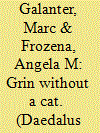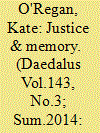| Srl | Item |
| 1 |
ID:
132761


|
|
|
|
|
| Publication |
2014.
|
| Summary/Abstract |
Over the past half-century, the number of cases entering American federal and state courts has multiplied. But, largely unobserved by the public, the percentage of those cases that are disposed of by trial has steadily decreased. In recent decades, as the increase in filings has leveled off but the percentage of cases reaching trial has continued to fall, the absolute number of trials has decreased as well. Conducting trials is a shrinking portion of what judges do. The effects of this turn away from trials on judges, on litigants, and on public perceptions of the legal system remain to be explored.
|
|
|
|
|
|
|
|
|
|
|
|
|
|
|
|
| 2 |
ID:
132775


|
|
|
|
|
| Publication |
2014.
|
| Summary/Abstract |
In a society such as South Africa in which the past has been deeply unjust, and in which the law and judges have been central to that injustice, establishing a shared conception of justice is particularly hard. There are four important strands of history and memory that affect the conception of justice in democratic, post-apartheid South Africa. Two of these, the role of law in the implementation of apartheid, and the grant of amnesty to perpetrators of gross human rights violations, are strands of memory that tend to undermine the establishment of a shared expectation of justice through law. Two others, the deeprooted cultural practice of justice in traditional southern African communities, and the use of law in the struggle against apartheid, support an expectation of justice in our new order. Lawyers and judges striving to establish a just new order must be mindful of these strands of memory that speak to the relationship between law and justice.
|
|
|
|
|
|
|
|
|
|
|
|
|
|
|
|